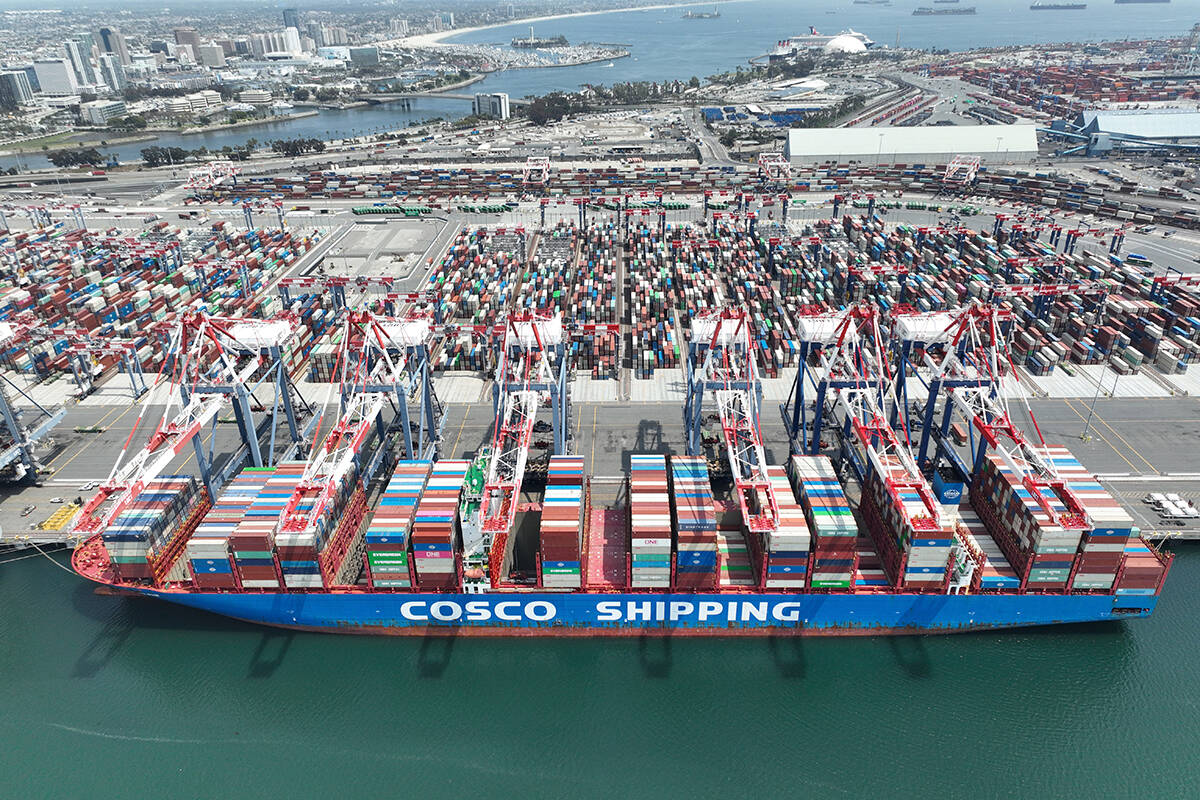Fed cattle steady
Fed cattle were mostly steady last week, said Canfax.
Active trade did not develop until midweek.
Volume rose four percent to 21,600 head. Fed cattle exports to the United States were 18,000 head, the largest since mid November.
Alberta prices Feb. 23 were steers $87 per hundredweight live and $146 dressed while heifers were $86.25-$87.45.
Canfax noted that the U.S. cash market strengthened as did U.S. cutouts. That should support Canadian cattle prices, as will fairly current front-end supplies, full kill weeks and a glimmer that beef buying interest will improve into March.
Read Also

U.S. softens fees on Chinese shipping
The U.S. starts charging new fees on Chinese ships on Oct. 14. What are the ramifications for their ag exports?
Cow supplies will tighten in March, pushing prices higher and possibly resulting in larger fed cattle slaughter.
But Canfax said other factors are weighing on the market such as the Canadian slaughter utilization rate of only 70 percent, carcass weights that are 20 pounds heavier than last year and expectations of building fed cattle inventories through the second quarter.
Smaller slaughter
United States cut-out values rose again thanks to small cattle kills and reduced production. The Choice cutout gained $5.20 per hundredweight and the Select $4.60. A $10 per cwt. gain in cutouts in two weeks may be enough to entice U.S. packers to kill more cattle.
Canadian cutouts last week were mixed with the AAA/AA spread narrowing. The AAA cutout declined 21 cents while the AA gained $2.40. Beef sales in Canada are still considered slow although better action was noted for sales heading into March. Small kills supported the strong boxed beef prices. Some products continue to remain at a premium to U.S. equivalents, a precarious position, said Canfax.
Calgary wholesale prices on handyweight steers for delivery this week are steady at $152-$154.
Feeder markets weaken
Feeder cattle prices were under pressure last week in most weight categories.
Light steer calves 300-400 lb. were steady to 50 cents higher than the week before, but 400-700 lb. steers were $2-$3.75 lower. Steers 700-900 lb. and heavier fell $2.50-$3.75.
Heifers were also under pressure but in the lighter weights with 300-700 lb. down $1.50-$3.25. Heifers 700-900 lb. fell $1.50-$2 while 900 lb. and heavier heifers were steady.
D1, 2 cows were steady to 25 cents higher, averaging $33.41. Butcher bulls traded steady, averaging $30.96.
Volumes through Alberta auction markets were slightly less than 35,000 head, 11 percent below last week and 24 percent lower than a year ago.
Even with the U.S. fed market rebounding, a weak summer futures market is affecting trade on heavier feeder cattle. Lighter feeder cattle heading to grass will likely trade steady to higher toward the spring, Canfax said.
Stock bred cows were steady with most trade at $750-$1,050 and tops to $1,500. Plainer types were $450-$700.
Bred heifers in central and northern Alberta fell with most trading at $800-$1,020 and plain types $550-$750. Cow-calf pairs were $900-$1,200 in central and northern Alberta.
Hog prices rise
Market-ready hog supplies continued a little tight in the U.S. last week, leading to higher hog prices.
But packer margins were poor, leading to speculation that they would begin to reduce slaughter.
Pork stocks are rising. The U.S. Department of Agriculture reported that stocks rose to 528.46 million lb. at the end of January, up six percent from the same time last year and a record for that date.
The composite pork carcass cut-out value rose to $65.17 US Feb. 24, up from $62.87 Feb. 17.
The Iowa-southern Minnesota live cash price for hogs delivered to plants firmed to $45.50 per cwt. Feb. 24, up from $44 Feb. 17.
Federal slaughter in the U.S. was estimated at 1.95 million last week, down from 1.98 million the week before.
Analysts believe that pork exports must increase to offset the increase in meat supply, particularly of chicken, which is backing up as foreign buyers shun poultry on worries about avian flu.
Sheep steady
Ontario Stockyards Inc. reported 1,382 sheep and lambs and 156 goats traded. Lambs fetched barely steady prices. Sheep and goats sold steady.
















